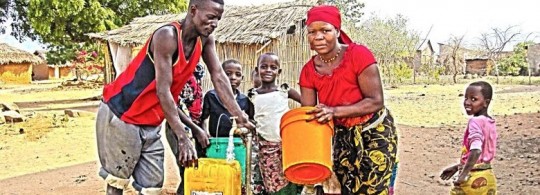
"Beyond donations", Ferrovial's vision for working with NGOs
20 of February of 2015
After working for two years in collaboration with NGO ONGAWA in a project to provide access to water and a sewer system in Tanzania as part of our “Social Infrastructure” program, we decided to document the process of working together in a Case Study prepared by the Innovation and Technology for Development Centre at the Technical University of Madrid.
A commitment to society is one of the foundations of Ferrovial’s Corporate Responsibility strategy; we are committed to supporting the socio-economic development of local communities in the countries where we operate and in other areas with unmet basic needs, with the goal of having a positive impact on human development.
We implement this commitment by participating in social projects with more than just financial resources—we also provide our employees’ talent and skills and our accumulated technical knowledge.
The “Maji Ni Uhai” (Water is Life) project was a watershed for Ferrovial and its social commitment as it showed that a company can multiply its contribution to human development by doing what it does best. In our case, that means building infrastructure. Consequently, we decided to support this kind of operation and develop “Social Infrastructure“, a cooperation programme based on employee involvement in which Ferrovial confirms its role as an actor in cooperation by playing more than a purely financial role. Under this approach, we contribute not only funds but also technical assistance, technology and expertise in project development, involving the company transversally in a strategic community outreach programme.
The special feature of this innovative collaboration method within international cooperation is the public-private partnership between a company, an NGO and the regional governments or administrations in the intervention area. The relationship between Ferrovial and AMREF could be seen almost as a joint venture, where Ferrovial contributes not only funds but also technology, expertise and its acknowledged management capabilities in infrastructure projects. The projects are managed jointly by a Steering Committee. The Steering Committee comprises representatives of Ferrovial and the NGO and meets at least four times a year. It is in charge of ensuring proper implementation of the cooperation agreement, approving any modifications to the budget, technical changes, etc. This innovative cooperation method allows for more efficient resource management, more transparency and better acceptance of projects by local communities.
Twenty-nine proposals were submitted in the first round of applications for the programme in August 2011. They included one by ONGAWA, an NGO specialised in technology for human development, water and sewage that has expertise in corporate volunteer programmes and collaboration with companies. ONGAWA was an ideal partner because it has capabilities (expertise in water and sewage, and a presence on the ground) that complement those of Ferrovial. Furthermore, it is made up of engineers, who speak the same language as Ferrovial, providing for smoother cooperation. The project was surrounded by expectations and uncertainties at the outset. The approach for a company to work with an NGO was relatively new in Spain and, though the scope for achieving a multiplier effect was considerable, so too was the risk of failure.
Both organisations provided complementary resources and abilities to the project. One of the lessons we learned at this stage was that each partner’s functions and responsibilities and the coordination and decision-making mechanisms must be set out clearly in the cooperation agreement from the beginning. The project’s main objective was to provide basic drinking water supplies to 10 villages in the Maore and Kihurio wards of the Same district in north-eastern Tanzania. The plan included building and upgrading water supply infrastructures in two multi-village systems dating from the 1960’s which had serious deficiencies, and training the local communities and authorities to ensure proper operation and maintenance of the systems in the medium-long term.
Cooperation between ONGAWA and Ferrovial grew stronger as the project moved forward, and a spirit of commitment and mutual trust developed among the members of the Steering Committee. We realized that the Steering Committee is the key to the making the cooperation work, and that the greater its members’ knowledge, capacities and motivation, the easier the project is to manage. Moreover, transparency, trust between partners and a shared vision and goals are vital for effective cooperation. Ferrovial employees’ talent and time, contributed through the corporate volunteer programme, were one of the most innovative features of the Social Infrastructure Program. ONGAWA expected the volunteers to provide high-level technical knowledge to assess and improve infrastructures, while Ferrovial expected them to gain new skills through adapting to a very different environment, and that this would enhance their motivation and their pride in belonging to the company.
After receiving the project documentation and practical information about the trip, the volunteers spent two weeks in Tanzania in July 2012, when most of their work on the project took place. Because of their understanding of, and adaptation to, the situation on the ground, the volunteers contributed greatly to achieving the project goals.
By the time the project ended, the supply systems were operational, serving almost 100% of the 27,028 local residents and more than 50,000 indirect beneficiaries. In addition, registered community entities were created, trained and placed in charge of the infrastructure, and a preventive maintenance system was established. The project had a major impact on living standards, by reducing the time employed to get water (under 15 minutes for almost 75% of the population), freeing up women’s time to devote to productive activities, and providing more water for consumption and hygiene.
This project, implemented in Tanzania with ONGAWA, proved that cooperation between a company and an NGO is possible and provides added value when implementing development projects. The lessons learned from the project and its cooperation model serve as a template for other editions of the programme. The programme effectively channels employees’ concerns about social issues while helping to develop and enhance interpersonal skills on the part of participating volunteers.
One of the main take-aways was that the project was a learning process: for the volunteers, for Ferrovial and ONGAWA staff, and for the Same District Council. The lessons learned about the Social Infrastructure Programme approach can be summarised as:
- Management support is vital for the Programme’s success and sustainability.
- Work on the ground is a key component of the Programme since it is highly motivating for the volunteers.
- Alignment of the Programme with Ferrovial’s core business multiplies the company’s contribution to projects.
- The Programme has great potential to enhance employees’ pride in belonging to the company.
The outcome of the cooperation between Ferrovial and ONGAWA in the framework of Ferrovial’s Social Infrastructure Programme shows that a partnership between different actors in cooperation offers an opportunity and is a valuable instrument for helping to eradicate poverty.






There are no comments yet